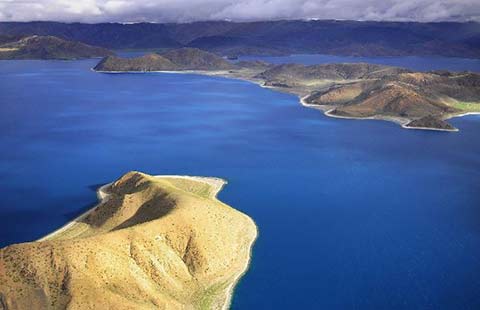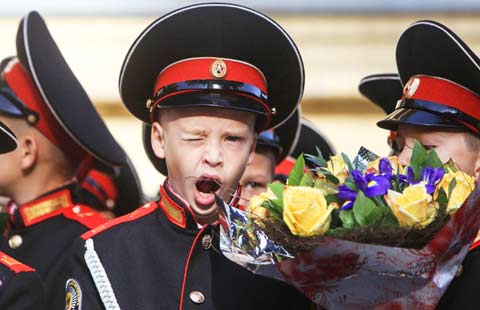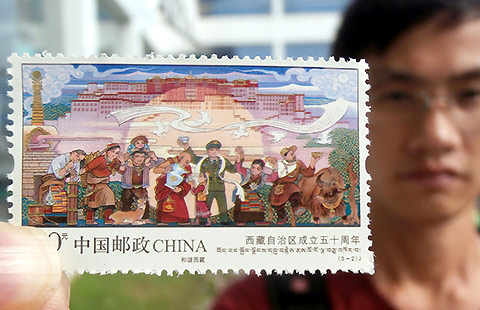China sticks to freedom of religious belief: official
Updated: 2015-09-08 06:12
(Xinhua)
|
||||||||
LHASA - The Communist Party of China (CPC) and the government will adhere to policies that ensure the freedom of religious belief, top political advisor Yu Zhengsheng said in Tibet on Monday.
Yu made the remarks during a visit to Jokhang Temple, a key Tibetan Buddhism monastery located in the heart of Lhasa, where he is heading a central government delegation to celebrate the 50th anniversary of the founding of Tibet autonomous region.
"In the past half-century, people from the religious circle of Tibet, taking eminent monks of all generations as examples, have upheld CPC leadership and the socialist system and made significant contributions to national and ethnic unity, religious and social harmony," said Yu, chairman of the National Committee of the Chinese People's Political Consultative Conference.
Some 100 monks at Jokhang Temple welcomed Yu and the delegation in two lines at the gate, blaring horns and burning incense to receive the guests.
Yu brought to the 1,341-year-old Jokhang Temple a banner inscribed by Chinese President Xi Jinping "enhancing ethnic solidarity, building a beautiful Tibet," and a colorful vase standing for peace. He also gave alms to the monks.
President Xi and the central authorities have been caring about the circle of Tibetan Buddhism, according to Yu. In June, Xi met with the 11th Panchen Lama Bainqen Erdini Qoigyijabu; last month, central authorities convened a key meeting on Tibet, outlining plans for the region's sustainable development and long-term stability.
Religious personnel bear great responsibilities, Yu said. He also asked them to reinforce management over temples and implement religious policies to achieve stability and harmony.
Tibetan Buddhism is the dominant religion in th plateau region, where 92 percent of about 3.2 million inhabitants are Tibetans.
A government white paper released on Sunday said China has fully respected freedom of religious belief, and gave equal attention and protection to all religions and sects, adding that there are 1,787 sites for different religious activities in Tibet, and more than 46,000 resident monks and nuns.
The central government has spent more than 1.4 billion yuan (about $220 million dollars) on restoring Tibetan cultural relics and refurbishing key monasteries, it said.

 Aerial view of Yamzho Yumco Lake in Tibet
Aerial view of Yamzho Yumco Lake in Tibet
 Chinese 'blade runners' fight for sports dreams
Chinese 'blade runners' fight for sports dreams
 The world in photos: Aug 31 - Sept 6
The world in photos: Aug 31 - Sept 6
 Breath of fresh air for a 'living fossil'
Breath of fresh air for a 'living fossil'
 Learn to behave like a real noble
Learn to behave like a real noble
 50th anniversary of Tibet autonomous region
50th anniversary of Tibet autonomous region
 Red carpet looks at the 72nd Venice Film Festival
Red carpet looks at the 72nd Venice Film Festival
 China beats Russia in 4 sets at volleyball World Cup
China beats Russia in 4 sets at volleyball World Cup
Most Viewed
Editor's Picks

|

|

|

|

|

|
Today's Top News
Sarah Palin: Immigrants should 'speak American'
Germany frees up funds for refugees, speeds up asylum procedures
China 2014 GDP growth revised down to 7.3%
White paper on Tibet reaffirms living Buddha policy
China to introduce circuit-breaker for stock market
Austria, Germany open borders to migrants
Central government steps up economic support for Tibet
China economy enters 'new normal' eyeing 7% growth rate: G20
US Weekly

|

|







